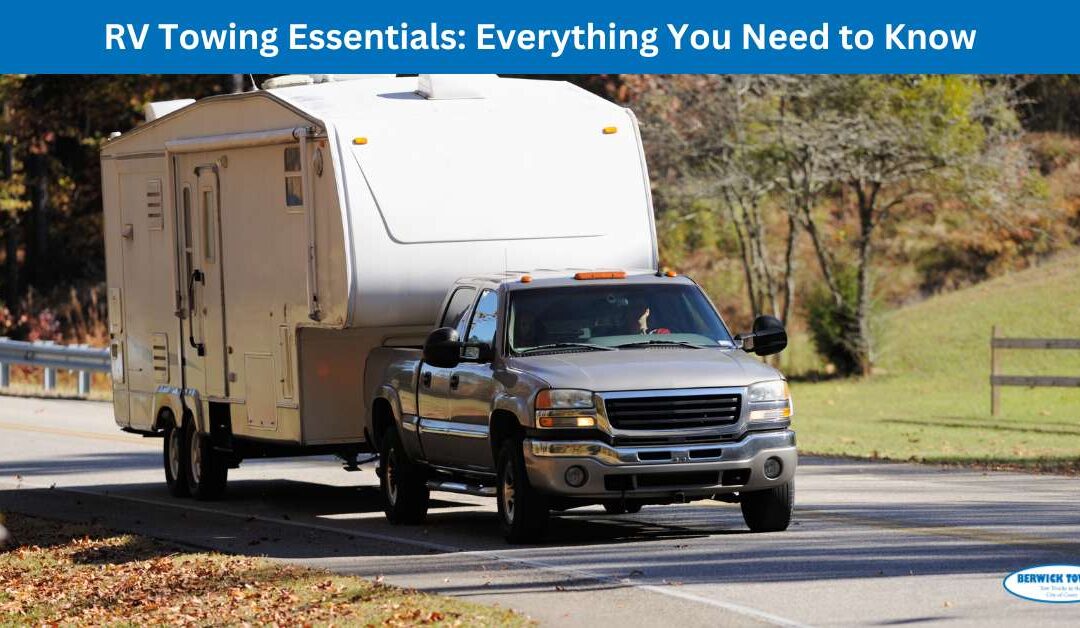Recreational Vehicle (RV) towing is a popular way to explore new destinations while bringing along the comforts of home. Whether you’re towing a travel trailer, fifth wheel, or another type of RV, understanding the essentials is crucial for a safe and enjoyable journey. This comprehensive guide covers everything you need to know about RV towing, from equipment and safety tips to legal considerations.
Know Your RV’s Tow Capacity:
Before hitching anything to your RV, understand its towing capacity. This information is typically found in the owner’s manual or available from the manufacturer. Exceeding your RV’s towing limit can lead to mechanical issues, compromising both safety and performance.
Selecting the Right Tow Vehicle:
Choose a tow vehicle that matches the towing requirements of your RV. Consider factors such as engine power, towing capacity, and the type of hitching system needed. Many RVers prefer trucks or SUVs with strong towing capabilities for optimal stability and control.
Hitching Systems and Weight Distribution:
Invest in a quality hitching system designed for your RV type. Weight distribution hitches help distribute the load evenly between the RV and the tow vehicle, enhancing stability and reducing sway. Follow the manufacturer’s recommendations for proper installation and adjustments.
Braking Systems for Towed Vehicles:
Depending on the size and weight of your towed vehicle, you may need a supplemental braking system. These systems help the RV’s brakes handle the additional load, improving overall braking performance and safety.
Understanding Hitch Classes:
Hitches come in different classes based on their weight-carrying capacities. Class I to Class V hitches accommodate various towing needs. Match the hitch class to your RV and tow vehicle specifications, ensuring compatibility for a secure connection.
Regular Maintenance Checks:
Perform regular maintenance checks on your RV and towing equipment. Inspect the hitch, safety chains, lights, and brakes before each journey. This proactive approach helps prevent issues and ensures a safe towing experience.
Check State Towing Regulations:
Different states may have specific towing regulations and restrictions. Familiarize yourself with the towing laws in the states you plan to visit, including speed limits for vehicles towing trailers and any special requirements for RV towing.
Practice Safe Driving Habits:
RV towing alters the handling and braking dynamics of your vehicle. Practice safe driving habits such as maintaining a moderate speed, leaving ample space between vehicles, and avoiding sudden maneuvers. Be especially cautious when turning, merging, or navigating hills.
RV Weight Considerations:
Pay attention to the weight distribution within your RV. Properly load heavy items over the axles and distribute weight evenly. An imbalanced load can lead to swaying, affecting your ability to steer and increasing the risk of accidents.
Campground and Parking Considerations:
Plan your route with considerations for RV-friendly roads, bridges, and tunnels. When reaching your destination, research campgrounds and parking areas that can accommodate RV towing. Ensure there is enough space for maneuvering and parking your rig.
Conclusion:
Embarking on RV towing adventures requires careful planning, adherence to safety guidelines, and a thorough understanding of your RV and tow vehicle capabilities. By following these essentials, you can confidently navigate the open road, enjoying the freedom and flexibility that RV towing offers while ensuring a safe and memorable journey.
If you are in Pakenham, Victoria 3810, and looking for a car removal service, this is the best way to visit us.
Contact Us
Berwick Towing & Transport
27B William Rd
Berwick VIC 3806
(03) 7035 7815
https://berwick-towing.com.au/

